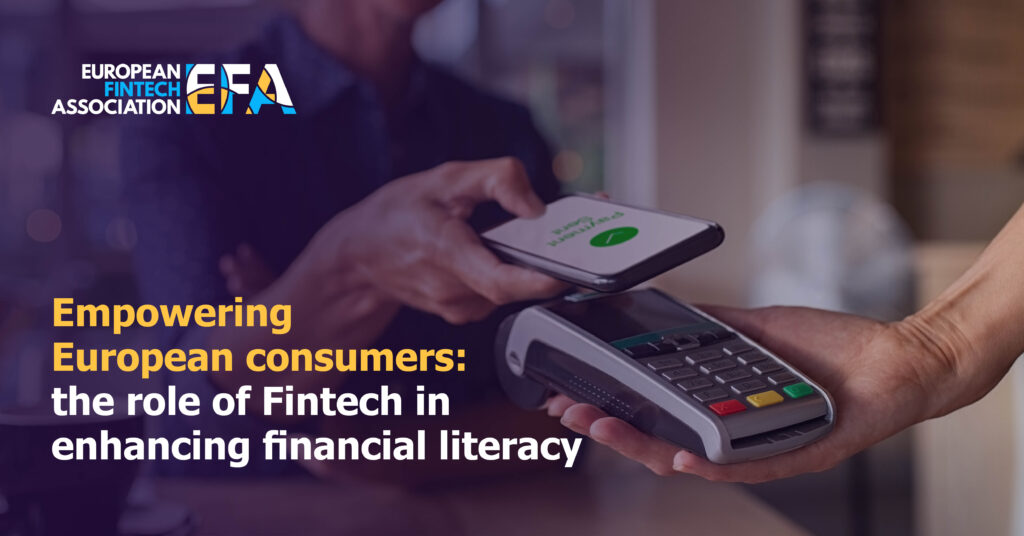
In recent years, the digitisation of the financial services industry has provided European consumers with access to sustainable credit, new payment options and effective financial tools. For the sector, this much-needed innovation is helping to reduce costs, speed up access to capital, improve transparency and promote financial inclusion.
With over 40 leading European FinTech companies – ranging from payments, lending, banking, robo-advice, identity verification, investment as well as software-as-a-service – supporting European citizens and businesses, the European Fintech Association is at the forefront of this transformation, supporting European citizens by putting the consumer’s best interests first and increasing consumer choice, transparency, and cost-effectiveness.
Transparency and consumer-centric solutions
The traditional financial services sector has long been criticized for exploiting consumers with high interest rates and excessive fees. This outdated system is increasingly being challenged by the fintech industry, which is offering more transparent and consumer-friendly alternatives. According to the OECD’s 2023 International Survey of Adult Financial Literacy1, only 53% of adults across participating countries achieved a score considered financially literate. This highlights the urgent need for more transparent and educational financial solutions.
Fintech companies provide fairer, more sustainable, and innovative solutions that prioritize consumer needs, offering products such as interest-free Buy Now, Pay Later (BNPL) options, fair and transparent digital banking services and accessible ways to explore the world of investing. These solutions not only offer more favorable terms but also promote financial well-being by enabling users to manage their finances more effectively.
Financial wellness and literacy initiatives
Financial wellness is a central focus for many fintech companies. Their commitment to consumer-centric solutions includes providing tools and resources that help individuals make informed financial decisions. According to the same OECD survey2, only 26% of respondents across 26 countries could correctly answer questions about simple and compound interest, underscoring the need for improved financial literacy.
Fintech companies address this gap by offering a range of products designed to enhance financial literacy and wellness. Spending overviews, budgeting tools, and educational resources empower consumers to take control of their finances. Klarna, a global payments network and shopping assistant, launched a financial education initiative specifically for young customers. Users between the ages of 18 and 25 who use one of Klarna’s credit products for the first time were shown an explanatory video about financial products. This initiative aims to empower the younger generation to make thoughtful and responsible decisions when shopping online. At the same time, it launched a voluntary credit ‘opt out’ tool in the UK3 helping consumers to achieve their financial goals by choosing not to use credit, perhaps while saving for a specific life event or sticking to a very strict budget. Making ‘pre-decisions’ is a well-established way to manage self-control, and improves financial wellness.
Moreover, many fintech firms regularly publish data on key metrics such as late payment rates, information user demographics and other data about responsible use of financial services4. This transparency not only helps consumers make better choices but also encourages the entire industry to adopt more consumer-friendly practices.
Policy focus needed in Europe
As policymakers and regulators consider the future of financial services, the innovations and best practices of fintech companies offer valuable lessons in creating a more equitable and informed financial landscape. With the Commission’s new mandate, stakeholders should focus on the following elements:
- Empowering citizens and enhancing resilience – Increased financial literacy contributes to people’s wellbeing. It also protects individuals from high levels of unsustainable debt, and improves their participation in the global financial market. Europe needs to keep financial literacy programs high on the policy agenda.
- Promoting innovative products and services – With improved financial education, people are better at using financial products consciously and responsibly, reducing the need for overregulation. Europe must continue to promote innovation and competition leading to consumer-friendly services that support consumer’s responsible use of finance.
- Coordinating efforts – A coordinated financial education strategy can strengthen cooperation between the public and private sectors, distribute roles, and promote synergies. Europe needs to spearhead a supranational strategy to encourage Member States’ development of effective financial education programs.
- Regulatory efforts that make sense – Outcomes-based regulation can drive innovation and empower consumers. By setting targets with regard to consumer protection, lawmakers can ensure that the industry delivers results. However, regulation must be carefully designed to avoid unintended consequences that could harm consumers, such as overburdening them with unnecessary information and mandated disclosures.
- https://www.oecd-ilibrary.org/finance-and-investment/oecd-infe-2023-international-survey-of-adult-financial-literacy_56003a32-en ↩︎
- Ibid. ↩︎
- Your Money, May 24, 2023 https://www.yourmoney.com/credit-cards-loans/klarna-shoppers-can-opt-out-of-using-credit-to-avoid-spending-temptation/ ↩︎
- Wikipink, developed by Klarna, is an example to promote transparency and facilitate fact-based discussions on the global credit market. See: https://www.klarna.com/international/wikipink-global/ ↩︎
